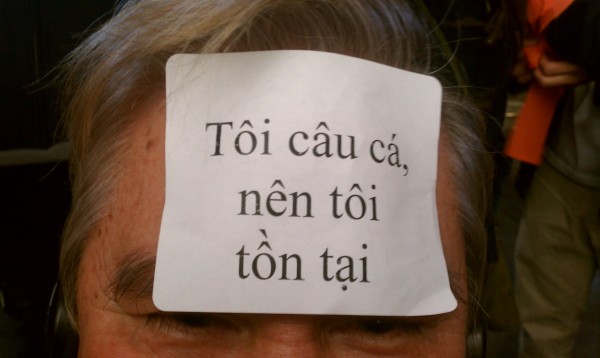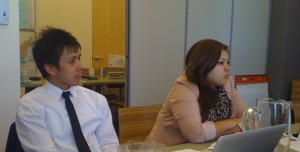A Vietnamese Gulf Coast fisherman at a community meeting, translated: “I fish to exist” or , “I fish, therefore I am.” (photo credit: Tap Bui)
Learnings from Our Listening Session with Gulf Coast Communities
By Cynthia Choi, AAPIP Senior Director, Philanthropic Advocacy
“When Hurricanes Katrina and Rita hit, the community could focus on repairing and rebuilding. They could see a future… but with the oil spill, their whole way of life has been completely decimated and has really impacted the well-being of the entire community.” – Tap Bui, Health Outreach Coordinator and Community Organizer
Hurricanes Rita & Katrina and the BP Oil Spill are devastating and catalyzing events that have drawn some attention to long standing community issues and needs. With waning media attention and the continued lack of philanthropic, public and private sector response, AAPIP is exploring how to best partner with AAPI leaders and organizations in the Gulf Coast as part of our commitment to working with the most impacted and under-resourced communities.
On January 24th, 2011 we convened a group of allies and stakeholders for a listening session, including : Tap Bui, Health Outreach Coordinator and Community Organizer, Mary Queen of Vietnam CDC; Minh Nguyen, Executive Director of VAYLA-NO; Celina Tran, Mississippi Coalition for Vietnamese American Fisherfolk and Families; and AAPIP staff: Cynthia Choi, Joe Lucero, Kelvin Vuong, Bo Thao-Urabe and Peggy Saika.
Our discussions focused on the issues, needs and priorities of the communities in this region, as well as learning about the community infrastructure and current organizing efforts. This listening session was a follow up to a White House Gulf Coast Briefing in September of last year co-hosted by AAPIP and the White House Initiative on Asian Americans and Pacific Islanders. This briefing had been the first philanthropic briefing on the Gulf Coast…
During the listening session, I learned the gulf coast communities affected by the oil spill are in crisis. The immediate and long term needs are vast in the region including: double-digit unemployment rates, foreclosures, lack of transportation, mental health, access to basic health services. These were long standing issues that have become more acute due to the oil spill and the lack of hope.
A summary of our discussions floated to the top several key themes including:
“From our youth we are learning that mental health problems are contributing to increased incidents of family violence, social isolation and has a domino effect on the community as a whole, ” said Minh Nguyen.
- The Vietnamese community are once again being left out just like during catastrophic hurricanes Katrina and Rita. There is a lack of or inadequate language translation provided in relief efforts. There is wide spread frustration and distrust of government as there has not been sufficient oversight in the subsistence claims process and predatory lawyering has exacerbated problems even further;
“Our members are disillusioned by the lack of government response and support. They don’t receive any information in their language about how to access available resources. At one time we used to have 300 members show up and now participation is dwindling because they have no hope, ” said Celina Tran.
- During and in the aftermath of the hurricanes, the philanthropic sector was more responsive and new funders that did not historically support the Asian American community were seeking ways to make investments albeit one time only investments;
- Many of the organizations were formed in the wake of hurricane disaster and subsequent environmental justices issues were already operating beyond their current capacity. The oil spill has placed unrelenting pressures that have caused some groups to re-evaluate their strategic priorities. They have received very little support to do strategic planning organizing and organizational infrastructure support;
Tap Bui said, “As much as we think the Vietnamese and the fisherfolk in particular have very little resources and support there are other communities that are also impacted with even less such as the Black Creole community in Louisiana and Thai shrimpers and crabbers in Alabama.”
- Community leaders spend an inordinate amount of time responding to requests for information, data and proving access to their members with very little concrete results;
This session confirmed for us the value and importance of AAPIP’s continued efforts to be rooted in the community and to expand the dialogue and participation of others. In the months ahead, we plan to share more information and briefing updates about AAPIP’s work in building democratic philanthropy with community and philanthropic allies in Gulf Coast region. Please visit our website or subscribe to this blog to get notifications on the developments.


